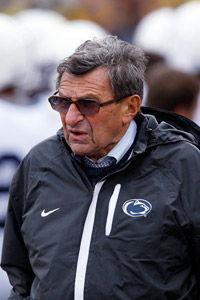
STATE COLLEGE Legendary former Penn State University football coach Joe Paterno died Sunday at age 85 after battling lung cancer.
Paterno was diagnosed in November. He had been at Mount Nittany Medical Center in State College since Jan. 13 under observation for what his family called minor complications from cancer treatments. Saturday evening, family spokesman Dan McGinn said Paterno was in serious condition and had “experienced further health complications.”
In addition to his wife, Sue, he is survived by the couple’s five children: Diana, Joseph Jr. “Jay”, Mary Kay, David and Scott, and 17 grandchildren. All of their children are Penn State graduates, and Jay Paterno was the quarterbacks coach at Penn State until earlier this month.
During his 46-year career, Paterno achieved the Division I coaching record with 409 career victories.
Penn State won more football games under Paterno’s leadership than any other coach in history and team was ranked No. 1 academically out of the top 25 football teams in 2009 and 2011 by the New America Foundation’s Academic Bowl Championship Series. Beaver Stadium was renovated and enlarged six times during his tenure.
“I wanted to build up, not break down,” an ailing Paterno told The Washington Post on Jan. 14, in his first public comments since he was dismissed from the university.
On Tuesday, Pennsylvania State Sen. Jake Corman spoke for nearly a half-hour at the end of Tuesday’s Senate session, and choked up with emotion as he praised Paterno’s accomplishments.
Corman, a Penn State alumnus who lives in State College, said Paterno was fighting for his life while trapped in an unfair situation. The Republican said he just wanted to remind fellow senators about Paterno’s many contributions to the university.
University trustees fired Paterno on Nov. 9 in the wake of allegations that former assistant coach Jerry Sandusky molested children on school property. Trustees have stood by their decision to fire Paterno and said earlier this week that Paterno was ousted in part because he didn’t meet a moral obligation to do more to alert authorities about a child sex abuse allegation against Sandusky.
In his interview with The Washington Post, Paterno said that he “didn’t know which way to go” after assistant Mike McQueary came to him in 2002 saying he had seen Sandusky sexually abusing a boy. Paterno said that McQueary “didn’t want to get specific” about details and he was hesitant to make follow-up calls because he didn’t want to be seen as trying to exert influence either for or against Sandusky.
“I didn’t know which way to go … And rather than get in there and make a mistake,” he said before trailing off.
A day after he heard McQueary’s allegation, Paterno reported it to his superiors. Paterno said he previously had “no inkling” Sandusky might be a child molester. Sandusky was criminally charged on Nov. 5 and faces dozens of counts.
Paterno was ousted four days later. Less than a week later, he was diagnosed with lung cancer.
The Post portrayed Paterno as frail from the cancer treatments and wearing a wig. Also recovering from a broken pelvis, Paterno spoke from a wheelchair at kitchen table and was so eager to defend his record that he insisted on continuing the interview from his bedside.
He said he was initially reluctant to speak because “I wanted everybody to settle down.” If Sandusky is guilty, “I’m sick about it,” Paterno said.
Paterno, who testified before a grand jury investigating Sandusky, was not a target of the criminal probe. Authorities said Paterno met his legal requirement to report suspected abuse. Paterno said he wished he knew how allegations against Sandusky didn’t come to light until years after the alleged assaults occurred.
Many alumni who attended town hall meetings in Pittsburgh, suburban Philadelphia and New York this week questioned why Paterno, after 61 years of service to the school, wasn’t afforded due process before his dismissal.
Two days after Sandusky was charged, state police Commissioner Frank Noonan said Paterno and other school leaders had a “moral responsibility” to do more and report allegations to police. Paterno announced his resignation the morning of Nov. 9. That day, he called the scandal “one of the great sorrows of my life. With the benefit of hindsight, I wish I had done more.”
The trustees fired him about 12 hours later, provoking a riot at Penn State.
“After 61 years he deserved better,” said Sue Paterno, his wife since 1962. “He deserved better.”
Stay with 6 News, WJACTV.com and WJACTV.com Mobile for continuing coverage.


